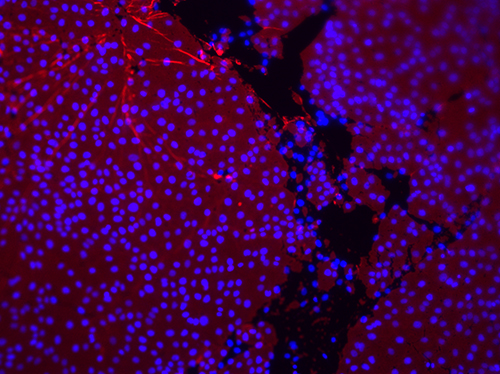Bioengineering Technologies for in vitro Models

Work from Prof Gautrot showing cells proliferating on nanosheets self-assembled at liquid-liquid interfaces
Researchers in the Centre for Predictive in vitro Models are actively engaged in Bioengineering research that underpins the development of new in vitro models and organ-on-a-chip technology. This includes microfluidics and chip design, 3D bioprinting, biomaterials, mechanobiology, sensors and computational modelling.
The Queen Mary in vitro models facilities includes micromanufacturing and 3D printing facilities to produce bespoke chips and to print complex cell seeded scaffolds and biomaterials within commercial chips.
On-going engineering projects funded by EPSRC- and NC3Rs are advancing biomaterials, micromanufacturing, and multi-material printing to position different cell types and matrix proteins with high spatial control inside chips. These engineering efforts aim to increase throughput, standardisation and physiologic fidelity so models can be used reliably in both discovery and regulatory contexts.
In addition, the CPM has a critical mass of researchers in the area of mechanobiology, exploring the effects of applied mechanical stimuli on cell function. This requires understanding of the physiological and pathological biomechanics and the development of bioengineering technologies to apply these stimuli within the context of predictive in vitro models. In addition, mechanical stimuli in the form of physical or topographical cues may be used within in vitro models to drive cell differentiation and the production of physiologically relevant extracellular matrices.


